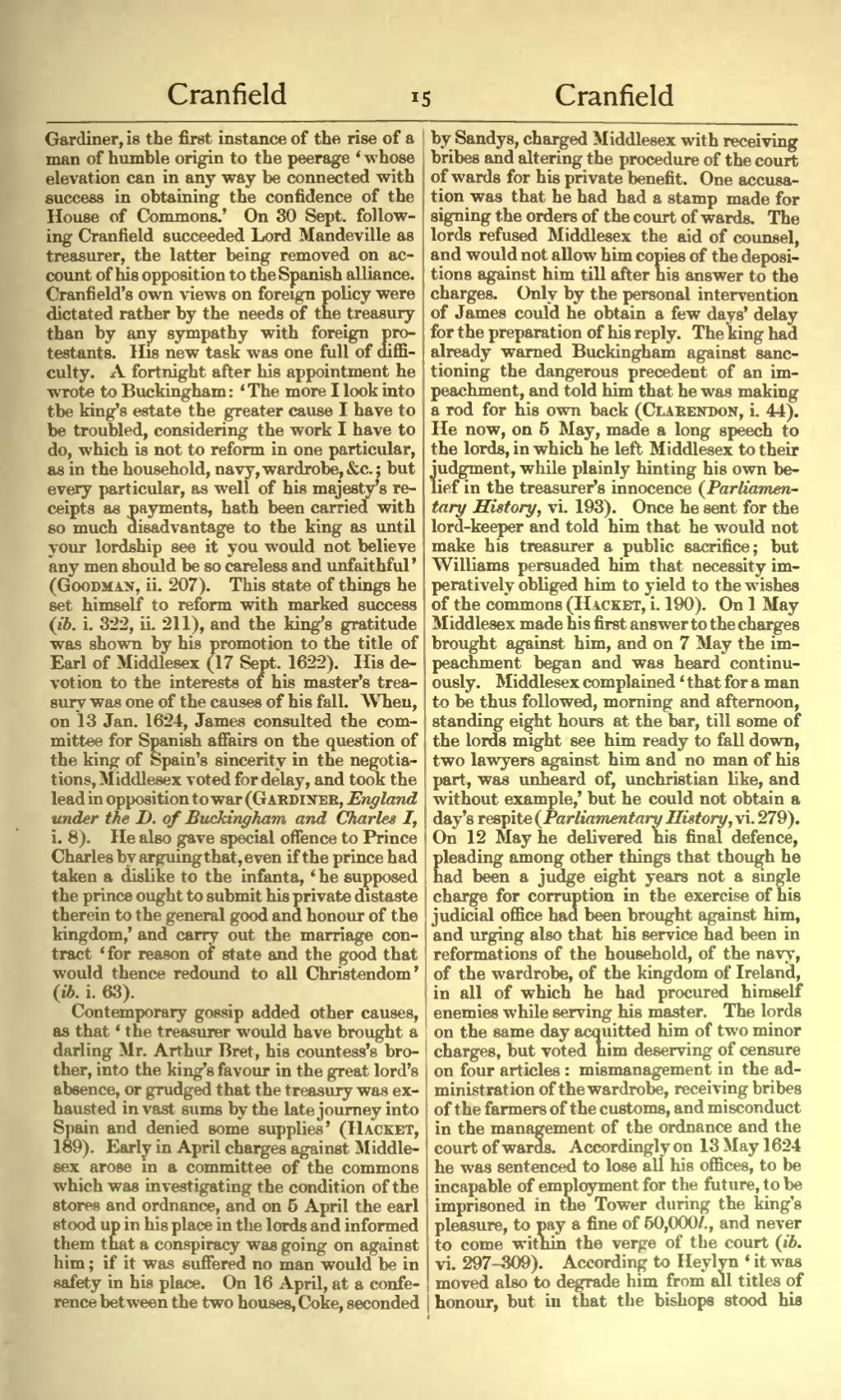Gardiner, is the first instance of the rise of a man of humble origin to the peerage ‘whose elevation can in any way be connected with success in obtaining the confidence of the House of Commons.’ On 30 Sept. following Cranfield succeeded Lord Mandeville as treasurer, the latter being removed on account of his opposition to the Spanish alliance. Cranfield's own views on foreign policy were dictated rather by the needs of the treasury than by any sympathy with foreign protestants. His new task was one full of difficulty. A fortnight after his appointment he wrote to Buckingham: ‘The more I look into the king's estate the greater cause I have to be troubled, considering the work I have to do, which is not to reform in one particular, as in the household, navy, wardrobe, &c.; but every particular, as well of his majesty's receipts as payments, hath been carried with so much disadvantage to the king as until your lordship see it you would not believe any men should be so careless and unfaithful’ (Goodman, ii. 207). This state of things he set himself to reform with marked success (ib. i. 322, ii. 211), and the king's gratitude was shown by his promotion to the title of Earl of Middlesex (17 Sept. 1622). His devotion to the interests of his master's treasury was one of the causes of his fall. When, on 13 Jan. 1624, James consulted the committee for Spanish affairs on the question of the king of Spain's sincerity in the negotiations, Middlesex voted for delay, and took the lead in opposition to war (Gardiner, England under the D. of Buckingham and Charles I, i. 8). He also gave special offence to Prince Charles by arguing that, even if the prince had taken a dislike to the infanta, ‘he supposed the prince ought to submit his private distaste therein to the general good and honour of the kingdom,’ and carry out the marriage contract ‘for reason of state and the good that would thence redound to all Christendom’ (ib. v. 229).
Contemporary gossip added other causes, as that ‘the treasurer would have brought a darling Mr. Arthur Bret, his countess's brother, into the king's favour in the great lord's absence, or grudged that the treasury was exhausted in vast sums by the late journey into Spain and denied some supplies’ (Hacket, 189). Early in April charges against Middlesex arose in a committee of the commons which was investigating the condition of the stores and ordnance, and on 5 April the earl stood up in his place in the lords and informed them that a conspiracy was going on against him; if it was suffered no man would be in safety in his place. On 16 April, at a conference between the two houses, Coke, seconded by Sandys, charged Middlesex with receiving bribes and altering the procedure of the court of wards for his private benefit. One accusation was that he had had a stamp made for signing the orders of the court of wards. The lords refused Middlesex the aid of counsel, and would not allow him copies of the depositions against him till after his answer to the charges. Only by the personal intervention of James could he obtain a few days' delay for the preparation of his reply. The king had already warned Buckingham against sanctioning the dangerous precedent of an impeachment, and told him that he was making a rod for his own back (Clarendon, i. 44). He now, on 5 May, made a long speech to the lords, in which he left Middlesex to their judgment, while plainly hinting his own belief in the treasurer's innocence (Parliamentary History, vi. 193). Once he sent for the lord-keeper and told him that he would not make his treasurer a public sacrifice; but Williams persuaded him that necessity imperatively obliged him to yield to the wishes of the commons (Hacket, i. 190). On 1 May Middlesex made his first answer to the charges brought against him, and on 7 May the impeachment began and was heard continuously. Middlesex complained ‘that for a man to be thus followed, morning and afternoon, standing eight hours at the bar, till some of the lords might see him ready to fall down, two lawyers against him and no man of his part, was unheard of, unchristian like, and without example,’ but he could not obtain a day's respite (Parliamentary History, vi. 279). On 12 May he delivered his final defence, pleading among other things that though he had been a judge eight years not a single charge for corruption in the exercise of his judicial office had been brought against him, and urging also that his service had been in reformations of the household, of the navy, of the wardrobe, of the kingdom of Ireland, in all of which he had procured himself enemies while serving his master. The lords on the same day acquitted him of two minor charges, but voted him deserving of censure on four articles: mismanagement in the administration of the wardrobe, receiving bribes of the farmers of the customs, and misconduct in the management of the ordnance and the court of wards. Accordingly on 13 May 1624 he was sentenced to lose all his offices, to be incapable of employment for the future, to be imprisoned in the Tower during the king's pleasure, to pay a fine of 50,000l., and never to come within the verge of the court (ib. vi. 297–309). According to Heylyn ‘it was moved also to degrade him from all titles of honour, but in that the bishops stood his

